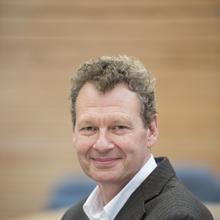Science inspires art inspires science
Scientists at a leading cancer research centre are embarking on a creative partnership with an artist to help inspire new works of art based on their research.
Swindon-based artist Pauline Pratt is beginning a 10-month residency at the University of Southamptons School of Medicine. She will be working closely with Professor Tim Elliott of the Cancer Sciences Division and Dr Anton Page of the Biomedical Imaging Unit who are both based at Southampton General Hospital.
The residency aims to explore the fascinating relationship between art and science and open up a dialogue between the artist and scientists. Pauline will use video and digital technology to create original artworks based on her involvement with researchers. The scientists, researchers and students will in turn benefit from the different way she explores the workings of the human body. The residency will result in exhibitions in early 2006 at the Winchester Gallery and the Greenham Gallery near Newbury in Berkshire.
During her time at the General Hospital Pauline will learn cell culture techniques and observe cell growth and mobility, which she will then record on video. She will also learn how to use sophisticated research equipment such as electron and light microscopes to produce high-quality images of cells in culture. Her base is a small studio in the Biomedical Imaging Unit Hospital where she is compiling a visual and written archive of her work and interpreting it to develop and create new artworks.
Pauline explains: "This project is a fantastic opportunity and will have a major impact on the way my work develops in the future. As an artist I am fascinated with the place where the body's internal landscape meets the persona presented to the world."
She already has strong links with the University of Southampton, having been awarded an MA with distinction from Winchester School of Art in 2003. During her MA studies she met Professor Elliott and Dr Page who since 2001 have lectured art students on their biomedical research and their own perceptions of the art science interface. Preceding her studies at Winchester, Pauline had developed an interest in using medical imaging and research as the starting point for her work. During the project Stephen Cooper, head of painting at Winchester School of Art will be offering advice and support as Paulines mentor.
Professor Tim Elliott adds: "I am thrilled that Pauline is joining the lab: we have worked so hard to win the Leverhulme grant, without which we would not be able to do this. I think it is easy to see how the visual arts draw on science as a source of imagery but it is less easy to see how art feeds back into science. Because both are hugely creative pursuits, Im hoping that the scientists in my lab will get as much out of working with Pauline as she will out of becoming an expert in tissue culture!"
The Leverhulme Trust is funding the project under its artists in residence scheme. The scheme aims to bring artists into research or study environments where creative arts are not part of the normal activities of the host group and to foster a creative collaboration between the artists and staff and students.
Related Staff Member
Notes for editors
- Digital images are available from Media Relations on request.
- The University of Southampton is a leading UK teaching and research institution with a global reputation for leading-edge research and scholarship. The University has around 20,000 students and nearly 5000 staff. Its annual turnover is in the region of £270 million.
- The Leverhulme Trust is the largest private funding organization in the UK, distributing funds of over £25 million every year. The Leverhulme Trust was established in 1925 under the will of the First Viscount Leverhulme with the instruction that it should support 'scholarships for education and research'.
The Trust launched its artists in residence scheme in 2000. For more information visit www.leverhulme.ac.uk
